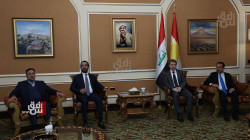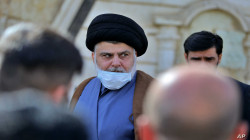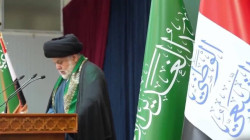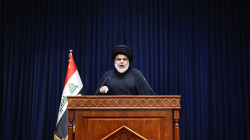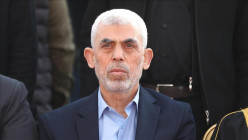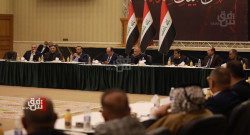Iraq's Shiite factions: a landscape of division

Shafaq News/ Since the fall of Saddam Hussein in 2003, Iraq's political landscape has been reshaped, with Shiite political parties rising to power. However, this political dominance has been anything but stable, marked by deep fragmentation, intense rivalries, and external influences, particularly from the United States and Iran. As a result, Iraq’s future remains in a delicate balance.
Seeds of Shiite Discord
The fragmentation of Iraq’s Shiite political community can be traced back to the collapse of Saddam Hussein's regime in 2003. Under the Sunni-dominated Ba'athist rule, Iraq's Shiite population endured political persecution and marginalization. Shiite political groups, including the al-Dawa Party and the Supreme Council for Islamic Revolution in Iraq (SCIRI), were banned and forced into exile, primarily in Iran, due to the government’s brutal crackdown on Shiite activists.
When Saddam's regime fell, these previously marginalized Shiite groups emerged as key players in shaping Iraq’s new political order. As Shiite parties began to dominate Iraq’s political landscape post-2003, alliances and coalitions were formed to consolidate influence. However, ideological differences, internal competition, and power struggles within these parties led to deep fragmentation.
While some factions, such as those aligned with Iran, gained strength, others like Muqtada al-Sadr's Patriotic Shiite Movement (the Sadrist,) pushed for a more independent course.
The Coordination Framework, an alliance of Iran-backed Shiite factions, has also been central to Iraq's political scene but has faced significant internal divisions. This fragmentation has made it difficult for Shiite factions to present a unified front, complicating governance and policymaking.
Al-Sadr's Exit: Vacuum of Chaos?
The 2021 Iraqi parliamentary elections, conducted under a new electoral law designed to reduce the influence of entrenched political elites, revealed the growing divisions among Shiite factions and shifted Iraq’s political power dynamics.
Muqtada al-Sadr's Movement, emerged as the biggest winner, securing 73 of the 329 seats in Iraq's Parliament. This victory reinforced his position as the most powerful political force in Iraq, surpassing long-standing Shiite parties such as Nouri al-Maliki's State of Law Coalition.
Al-Sadr’s populist appeal and anti-corruption message resonated especially with Iraq’s youth, many of whom felt disenfranchised by the political establishment.
Political analyst Dr. Zaid al-Mutlaq argued that Al-Sadr’s success was “a personal triumph for Muqtada al-Sadr” and a major setback for Iran’s influence in Iraq.
Conversely, Nouri al-Maliki's State of Law Coalition suffered a significant setback, winning only 33 seats, a sharp decline from the previous election. Al-Maliki, who served as prime minister from 2006 to 2014, faced criticism for corruption and mismanagement during his tenure. However, no judicial rule was issued against him.
A senior official from Al-Maliki’s coalition, Ahmed al-Khafaji, acknowledged that the loss of seats stemmed from widespread Iraqi frustration with the political status quo.
The Fatah Alliance, closely aligned with Iran-backed Popular Mobilization Forces (PMF), also saw its representation drop dramatically, from 48 seats in 2018 to just 17 in 2021. The head of the Fatah Alliance, Hadi al-Amiri, admitted, “The loss of seats shows the erosion of trust among the Iraqi people in the PMF’s role in politics.”
Following the 2021 elections, political fragmentation deepened when Muqtada al-Sadr ordered his 73 MPs to resign from the Iraqi Parliament in June 2022. Frustrated with the political gridlock and pervasive corruption, al-Sadr’s decision was seen as a strategic move to distance himself from the corrupt political system. “We cannot be part of a corrupt system that fails to serve the people of Iraq,” al-Sadr declared at the time.
His withdrawal allowed the Coordination Framework, to take control in the formation of the government and provide an opportunity for Prime Minister Mohammed Shia al-Sudani to consolidate his influence.
Political Chess: Iraq's Factions in Flux
Amid the fragmentation, shifting alliances have become a central feature of Iraq's political landscape. One such example is the defection of prominent Nouri al-Maliki ally Alia Nassif, who joined Prime al-Sudani’s Al-Furatain bloc.
Political analyst Hassan al-Tamimi commented, “This defection underscores the growing fragmentation within traditional Shiite political structures and highlights al-Sudani’s ability to consolidate power.”
In response, the Coordination Framework is moving toward forming a broad electoral alliance led by al-Sudani and Ammar al-Hakim of the al-Hikma Movement. The alliance is expected to include 14 other political entities and aims to present a united Shiite front, though internal divisions could complicate this effort.
Simultaneously, the Badr Organization, which has strong ties to Iran, faces internal pressure to reconsider its political alliances. Some members of the Badr Organization have suggested aligning with al-Sadr’s movement to ensure their political survival. Badr official Ali al-Asadi stated, “We are facing difficult choices as we seek to reconcile our political and military role.”
A New Kingmaker
The rise of Mohammed Shia al-Sudani has significantly shifted the balance of power in Iraq, raising alarms within the Shiite political establishment. Al-Sudani’s appeal lies in his pragmatic focus on governance, public services, and economic reforms, which have garnered widespread support among both Shiite and Sunni voters frustrated with the endemic corruption and political gridlock.
His technocratic approach contrasts with the traditional, sectarian-driven politics that have long dominated Iraq’s political scene. As he consolidates his power, many see al-Sudani as a potential rival to entrenched figures like Nouri al-Maliki, whose influence within the Shiite bloc has been undermined.
Despite initially being supported by the Coordination Framework, al-Sudani’s increasing popularity has led some to view him as positioning himself above party politics, potentially threatening their hold on power.
His rise also underscores a broader shift in Iraqi politics, with younger voters and disillusioned citizens eager for change.
Al-Sudani’s emphasis on reforms and public services offers an alternative to the sectarian fragmentation that has long hindered Iraq’s development, but it also places him at odds with those who prefer to maintain the status quo.
The 55-year-old man has also followed a pragmatic approach with the US and Iran.
2025: The Realm of Possibilities
As Iraq prepares for its 2025 parliamentary elections, the political landscape remains fluid, particularly within the Shiite factions, where alliances are still in flux.
Key figures such as Muqtada al-Sadr and Nouri al-Maliki are maneuvering for influence, while divisions within the Coordination Framework and the broader Shiite political sphere add layers of complexity to the unfolding scene.
In early 2024, Iraq’s three presidencies, the President, Prime Minister, and Speaker of Parliament, focused on election preparations, prioritizing logistical and technical support for the Independent High Electoral Commission (IHEC). Their discussions underscored the importance of a well-organized electoral process.
In a key move, the Council of Representatives extended the mandate of the IHEC Board of Commissioners for two more years on January 13, 2025, following a judicial ruling.
Despite these foundational steps, political parties have yet to fully launch their campaigns.
Jassim Al-Moussawi, a State of Law coalition lawmaker, noted that the momentum remains slow. “So far, we have not seen the political blocs make decisive moves toward the elections. Right now, everything remains at the stage of preliminary discussions, and the real competition will begin only in the final months leading up to the vote.”
With elections set for October 2025, political maneuvering is expected to escalate in the coming months. The potential return of Muqtada al-Sadr and his movement is emerging as a pivotal factor. Rahman Al-Jazaeri, a senior figure in the Coordination Framework, told Shafaq News that an official announcement regarding the return of the Sadr-led Patriotic Shiite Movement is anticipated after Ramadan. “The movement remains the most formidable force within the Shiite political spectrum, and if al-Sadr officially re-enters the race, he will undoubtedly emerge as a major contender,” he confirmed.
Al-Sadr’s possible comeback has already drawn responses from political rivals. Earlier in February, his movement responded sharply to comments made by Nouri al-Maliki, who asserted that the Coordination Framework would remain a dominant force in the next government, regardless of whether the Sadrists re-joined the political arena or not.
A senior Sadrist figure dismissed any notion of collaboration. “If our movement re-enters the political scene, it will be on our own terms. We have no intention of joining forces with the Coordination Framework in forming the next government,” he confirmed.
He elaborated further that while some individuals within the Coordination Framework might choose to align with al-Sadr’s vision of a national majority government, “there is no conceivable scenario where we stand alongside a coalition that represents everything we have sought to reform.”
The political stakes are high. While al-Sadr’s movement maintains its stance, internal divisions persist within the Coordination Framework. A key question is whether its factions can bridge their differences and form strategic alliances with smaller parties. If successful, they could mount a substantial challenge to both the Sadrists and Prime Minister Mohammed Shia Al-Sudani’s administration.
The Crossroads of Possibilities
According to experts, multiple political scenarios are unfolding as the country approaches the next elections, each with the potential to reshape the country’s leadership and governance. With less than a year until the vote, the balance of power remains uncertain, driven by internal rivalries and external influences.
One significant possibility is the resurgence of the Patriotic Shiite Movement. Although Muqtada al-Sadr withdrew from politics in 2022, his influence remains formidable, particularly among Iraq’s disillusioned youth and working-class supporters. Should he choose to re-engage, his return could challenge the Coordination Framework and unsettle Prime Minister Mohammed Shia al-Sudani’s government, altering the political landscape once again.
Another scenario centers on the Coordination Framework’s efforts to consolidate power. If the alliance can resolve internal disputes and strengthen ties with smaller factions, it may secure a dominant role in forming the next government. However, persistent rivalries with al-Sadr and leadership struggles within the bloc remain key obstacles to unity.
Meanwhile, Al-Sudani’s position presents a third potential outcome. His focus on governance and reform has distinguished him as a pragmatic leader capable of bridging sectarian divides. Yet, his growing independence from traditional Shiite power centers could expose him to political maneuvering. If he continues asserting autonomy, he could carve out a lasting role in Iraq’s evolving political order, though not without resistance from entrenched factions.
Beyond internal power struggles, Iraq’s political future will also be shaped by external dynamics, particularly the ongoing US-Iran rivalry. Washington supports certain factions while opposing Tehran’s expanding influence in Baghdad, adding another layer of complexity to the coalition-building process.
The US influence in Iraq has often exacerbated divisions within Shiite political factions, with many groups aligning either with Iran or the United States. This divide became even more pronounced after the US killing of Iranian General Qassem Soleimani in 2020, which fuelled deep mistrust between US-aligned factions and Iran-backed groups.
Ultimately, Iraq stands at a pivotal moment. As senior political analyst Mujash’e al-Tamimi described it, “The future is a puzzle where the missing pieces are constantly shifting. Stability will depend on whether Iraq’s political factions can find common ground, even as external pressures reshape the board.”
